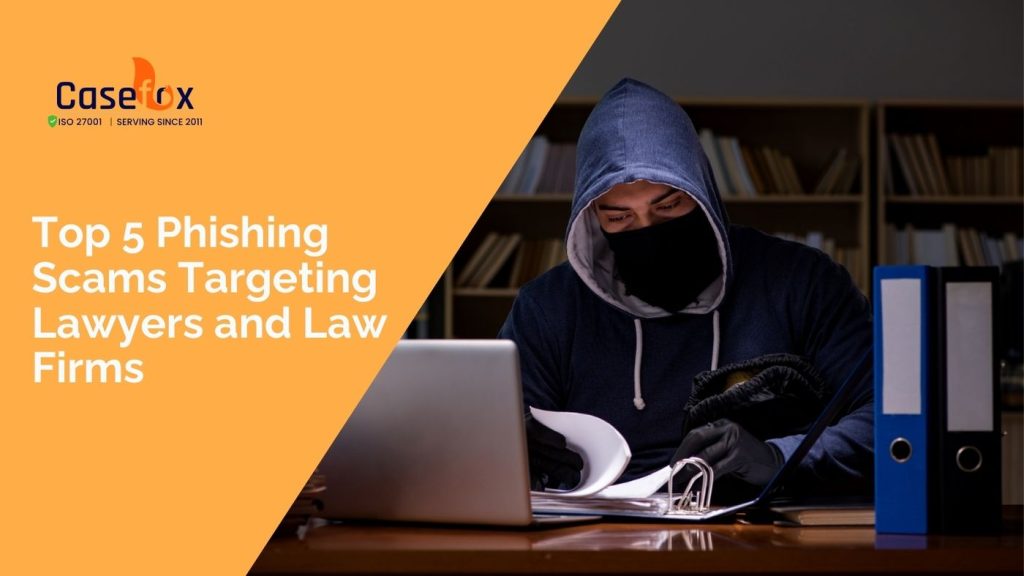Given the massive quantity of private data that lawyers and law firms handle on a daily basis, it is not unexpected that they are continually subjected to major cyber threats. As a result, cybersecurity has emerged as one of the most significant elements of modern legal practice. This applies to both individual attorneys and law companies.
One of the most popular types of fraud is phishing. It is a type of cybercrime that involves tricking a victim in order to get access to sensitive information. In particular, passwords, bank accounts, and other data.
Such hazards not only breach privacy, but they can also have major consequences for reputation and legal careers. That is why we will look at five different forms of phishing attempts aimed against lawyers and legal companies. We will also provide advice on how to defend yourself from these attacks.
Phishing with Fake Client Requests
One of the most common types of attorney scams may be considered phishing with fake client requests. How does it work? Attackers send lawyers or law firms emails that are supposedly sent by potential clients. These emails contain documents or links to websites. The latter requires the lawyer to enter their credentials for access. Very often, these documents contain viruses and malware. The latter allows fraudsters to gain access to the law firm’s computers and servers.
Attorneys are accustomed to dealing with vast numbers of paperwork, so they may not recognize a forged request right away.
This type of attack jeopardizes both the security of client data and the reputation of the law practice. After all, such an attack gives cyber criminals access to private documents. In turn, this can lead to serious legal consequences. This includes lawsuits from clients and potential violations of legal malpractice insurance standards.

How to protect against this threat?
- Law firms should use multi-factor authentication. This way they can prevent unauthorized access to their systems.
- Law firms need to train employees to recognize suspicious emails and carefully vet new clients both before opening any documents and before clicking on links.
From this perspective, we also hasten to tell you about one of the most sophisticated forms of phishing, the so-called big fish attack. In other words, whaling phishing. This is when fraudsters deliberately choose their victims among influential people in law firms or top managers. They try to steal confidential data and force the victim to take certain actions by sending the potential victim an email that looks like an official message from a colleague or client.
The actions may include a request to transfer money to a fake account. Since whaling phishing targets executives, it can both cause large-scale financial losses and disrupt the work of the entire company. That is why it is crucial to train all members of the law firm to recognize such fraudulent schemes and follow the basics of cybersecurity.
Phishing Through Legal Documents
Another common form of scamming lawyers is the falsification of legal documents. Scammers send fake requests or court documents to the lawyer that contain malicious attachments or links. Such attacks are usually aimed at getting the lawyer to install malware on their computer. The malware then allows fraudsters to access all of the firm’s files.
Fraudsters can also use fake court documents to cheat law firms and their clients out of money.
These types of attacks are often especially damaging to client trust and the firm’s reputation, as the law firm may not immediately notice the fraud.
How to protect yourself from the threat of such phishing?
- Lawyers should use up-to-date anti-virus systems.
- Software should be updated regularly.
- It is crucial to train employees not to open documents from unverified sources.
- Use secure methods of exchanging documents with clients.

Fake Payments and Payment Requests
Law firms are an attractive target for law firm scams because they constantly process financial transactions. As a result, bogus payment requests are among the most common types of fraud. Specifically, fraudsters send an email that appears to be an official message from a bank, requesting that funds be transferred to another account. Often, such emails appear so convincing that even expert lawyers fail to spot the deception.
It is obvious that this form of deception has disastrous ramifications for a law business. This involves financial losses, damage to reputation, and even legal litigation. Thus, cybersecurity for law firms has become an even more significant topic in this context.
How to protect yourself from phishing with fake requests and payments?
- Before making any financial transactions, lawyers need to check the authenticity of the request. To do this, contact the client or financial institution directly through known contacts.
- It is worthwhile to use the services of specialized cyber insurance providers to reduce financial risks in the event of fraud, such as cyber security insurance for law firms.
Social Engineering via Employees
This is a type of attack that uses the human factor to achieve its goals. That is, fraudsters send emails in which they convince law firm employees to perform certain actions. This may be a convincing request to provide passwords or confidential information. This type of legal scamming uses psychological techniques to manipulate employees into disclosing important data and providing access to the firm’s systems.
How to protect yourself?
- Implementation of multi-level authentication protocols. It will reduce the likelihood of unauthorized access to the firm’s systems.
- Training employees in the basics of cybersecurity.
- Regular training programs.

Phishing on Behalf of Regulatory Authorities
Fraudsters send lawyers letters that imitate messages from regulatory authorities and courts. Such emails may require lawyers to update their data, authenticate themselves, or perform other specific actions. Such legal scams often involve fake requests for additional data for legal professional liability insurance.
Since lawyers often communicate with various regulatory authorities, such emails can easily go unnoticed as fraudulent. However, following the instructions in these emails can lead to fraudsters gaining access to the personal data of clients.
How to protect yourself from such phishing?
- Check the authenticity of requests. You may do this by contacting the organization directly through official communication channels.
- Use encrypted email accounts.
- Apply appropriate cybersecurity policies.
The Bottom Line
Phishing attacks are a serious threat. Modern lawyer scams use increasingly sophisticated methods. By deceiving lawyers and firms, they gain access to confidential information of both the lawyers and their clients. Thus causing irreparable damage to reputation and beyond. So, the implementation of effective cybersecurity measures can significantly reduce the risks described above.
In particular, this includes the following steps. Regular staff training. Consultations with cyber insurance specialists. The use of multi-factor authentication. Verification of the authenticity of requests etc. Cybersecurity is an integral part of the successful operation of every law firm. So, do not ignore it to avoid devastating consequences for your business.

